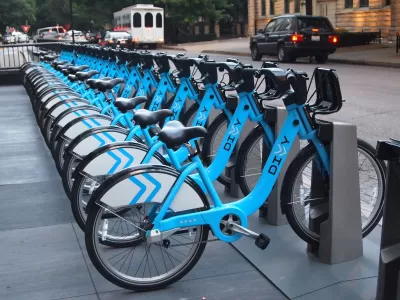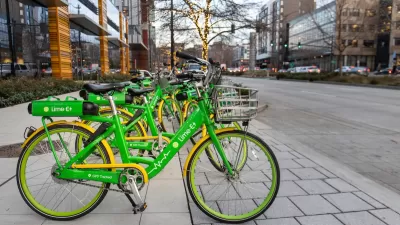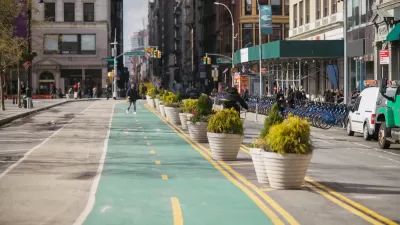The industry is seeing uneven support despite high ridership numbers.

“Is U.S. micromobility industry on the brink of a breakthrough? Or is the bottom about to drop out?” asks Kea Wilson in Streetsblog USA.
The signs are, in some ways, all over the place: while docked bike share systems are clocking record rides, “roaring back from pandemic-era lows and eclipsing last year’s record-setting trip numbers with reported 71.5 million journeys across U.S. and Canada in 2022,” operators like Lyft are pulling back on their systems and publicly subsidized systems are running out of funding, while dockless operators feel maligned and over-regulated.
The debate over whether shared micromobility systems should be part of public transit systems or receive public funding at all continues. “If holding the bike- and scooter-share universe captive to the whims of private shareholders feels inherently unstable, some micromobility leaders argue that holding it captive to the whims of transit-hostile U.S. governments is unstable, too — and while they say those governments shouldn't charge micromobility companies to operate on their roads, lest they be forced to pass those costs along to riders, governments also shouldn't necessarily be counted on to keep fleets running.”
FULL STORY: Micromobility Is Having a Weird Year

Planetizen Federal Action Tracker
A weekly monitor of how Trump’s orders and actions are impacting planners and planning in America.

Restaurant Patios Were a Pandemic Win — Why Were They so Hard to Keep?
Social distancing requirements and changes in travel patterns prompted cities to pilot new uses for street and sidewalk space. Then it got complicated.

Maui's Vacation Rental Debate Turns Ugly
Verbal attacks, misinformation campaigns and fistfights plague a high-stakes debate to convert thousands of vacation rentals into long-term housing.

In California Battle of Housing vs. Environment, Housing Just Won
A new state law significantly limits the power of CEQA, an environmental review law that served as a powerful tool for blocking new development.

Boulder Eliminates Parking Minimums Citywide
Officials estimate the cost of building a single underground parking space at up to $100,000.

Orange County, Florida Adopts Largest US “Sprawl Repair” Code
The ‘Orange Code’ seeks to rectify decades of sprawl-inducing, car-oriented development.
Urban Design for Planners 1: Software Tools
This six-course series explores essential urban design concepts using open source software and equips planners with the tools they need to participate fully in the urban design process.
Planning for Universal Design
Learn the tools for implementing Universal Design in planning regulations.
Heyer Gruel & Associates PA
JM Goldson LLC
Custer County Colorado
City of Camden Redevelopment Agency
City of Astoria
Transportation Research & Education Center (TREC) at Portland State University
Jefferson Parish Government
Camden Redevelopment Agency
City of Claremont





























